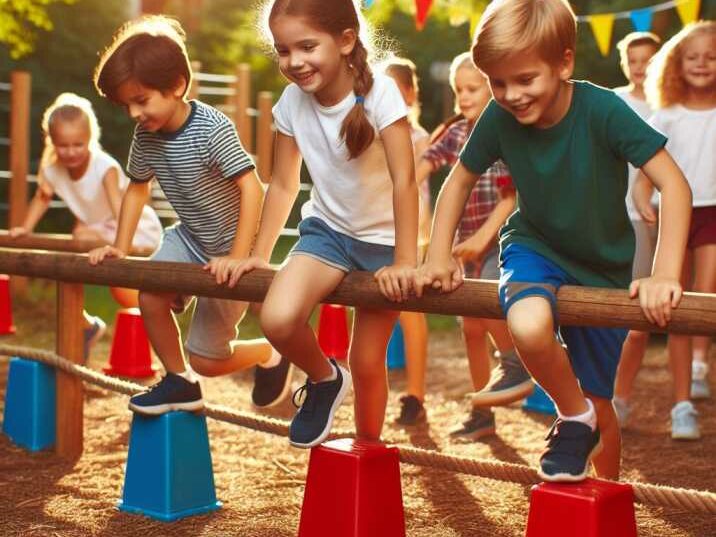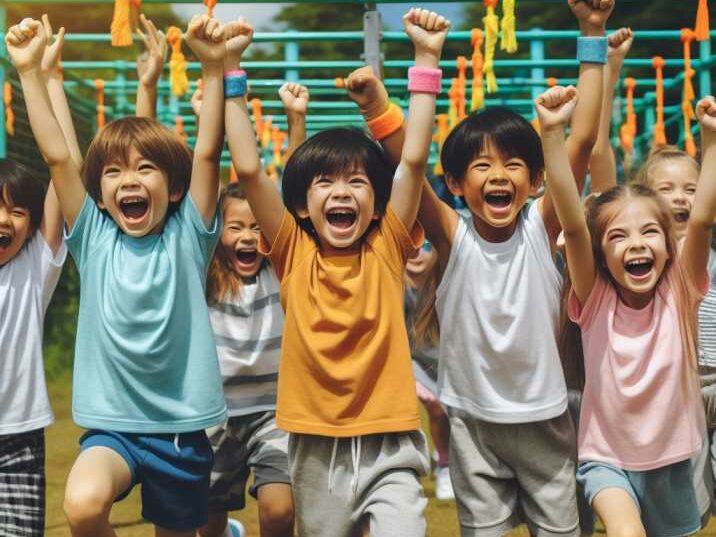5 Obstacle Courses on Kids Motor Skills
Table of Contents
Introduction
Obstacle courses have long been celebrated for their ability to instill resilience, teamwork, and physical prowess in individuals. However, their impact on the developmental journey of children, particularly in terms of gross motor skills, is a topic that warrants closer examination. In this article, we delve into the significance of obstacle courses in the context of children’s growth, shedding light on their role in fostering essential motor skills.

The Power of Obstacle Courses
Obstacle courses, with their varied challenges and hurdles, offer a holistic approach to physical development. From climbing walls to crawling through tunnels, each element engages different muscle groups, promoting coordination, balance, and strength. The very nature of these courses encourages children to navigate diverse terrains, enhancing their spatial awareness and proprioception.
Benefits of Obstacle Courses for Kids
- Motor Skill Enhancement: Obstacle courses target fundamental motor skills like running, jumping, and climbing, contributing to overall physical competence.
- Cognitive Development: The multifaceted challenges in obstacle courses stimulate cognitive functions, fostering problem-solving skills and quick decision-making.
- Social Interaction: Collaborative aspects of these courses promote teamwork, communication, and peer cooperation, crucial for social development.
- Confidence Building: Overcoming obstacles instills a sense of accomplishment, boosting self-esteem and confidence in a child’s abilities.

Unpacking Gross Motor Skills
Gross motor skills involve the use of large muscle groups and coordination of body movements. These skills are pivotal in executing activities such as walking, running, and playing sports. Obstacle courses act as a dynamic platform for refining and mastering these skills during a child’s formative years.
Obstacle Courses and Their Impact on Gross Motor Skills
The intricate design of obstacle courses compels children to engage in a range of movements that promote the development of gross motor skills. Let’s explore how these courses influence specific aspects of motor skill growth:
1. Balance and Coordination:
Obstacle courses demand precise movements, enhancing a child’s sense of balance and coordination. Activities like walking on narrow beams or stepping on platforms stimulate these skills.
2. Strength and Endurance:
Climbing walls and crawling through tunnels build muscle strength and endurance, contributing to the overall physical robustness of a child.
3. Spatial Awareness:
Maneuvering through obstacles sharpens spatial awareness, a crucial skill in everyday activities and sports.
4. Fine-Tuning Motor Planning:
Completing obstacle courses requires planning and executing a sequence of movements, refining a child’s ability to plan and execute motor actions.
Creating an Information-Based Table for Quick Reference
| Aspect | Description |
|---|---|
| Benefits of Obstacle Courses | Motor skill enhancement, cognitive development, social interaction, confidence building |
| Gross Motor Skills | Balance and coordination, strength and endurance, spatial awareness, motor planning |
Conclusion: Nurturing Potential Through Obstacle Courses
In conclusion, the integration of obstacle courses into children’s activities holds immense potential for fostering gross motor skill development. Beyond the physical benefits, these courses contribute to cognitive growth, social interaction, and confidence building. Parents, educators, and caregivers play a pivotal role in ensuring that obstacle courses are not only engaging but also tailored to the developmental needs of each child.
As we navigate the dynamic landscape of children’s growth, obstacle courses emerge as a beacon, unlocking potential and sculpting the foundation for a lifetime of physical prowess and resilience.

FAQs:
- How early can children start obstacle courses? Children can begin participating in age-appropriate obstacle courses as early as preschool age, usually around 3 to 4 years old.
- Are there safety concerns with obstacle courses for kids? Safety is paramount. Courses should be age-appropriate, well-supervised, and designed with safety features to minimize risks.
- Do obstacle courses benefit children with special needs? Yes, tailored courses can be designed to accommodate children with special needs, providing inclusive opportunities for skill development.
- Can obstacle courses be set up at home? Simple, safe obstacle courses with household items can be created for home use, fostering gross motor skills in a familiar environment.
- How often should children engage in obstacle courses? Regular participation, ideally a few times a week, allows for consistent skill development and physical activity.
- What role do parents play in supporting obstacle course participation? Parents can encourage and support their children, ensuring courses are appropriate, safe, and aligned with their developmental stage.
- Do obstacle courses improve academic performance? While not a direct academic booster, the enhanced cognitive and problem-solving skills acquired may positively influence academic achievement.
- Are there psychological benefits to completing obstacle courses? Yes, overcoming challenges fosters resilience, perseverance, and a positive mindset, contributing to mental well-being.
- How can schools incorporate obstacle courses into physical education programs? Schools can design age-appropriate courses, integrating them into physical education curricula to enhance students’ overall physical development.
- What types of obstacles are suitable for different age groups? Age-appropriate obstacles include low crawl tunnels and balance beams for younger children, progressing to more complex challenges for older kids.
- Can obstacle courses be adapted for virtual or indoor settings? Yes, virtual or indoor obstacle courses using technology or creative setups can provide engaging alternatives, especially in limited space.
- Are there competitions or events focused on children’s obstacle courses? Yes, organized events and competitions cater specifically to children, fostering a sense of achievement and friendly competition.


